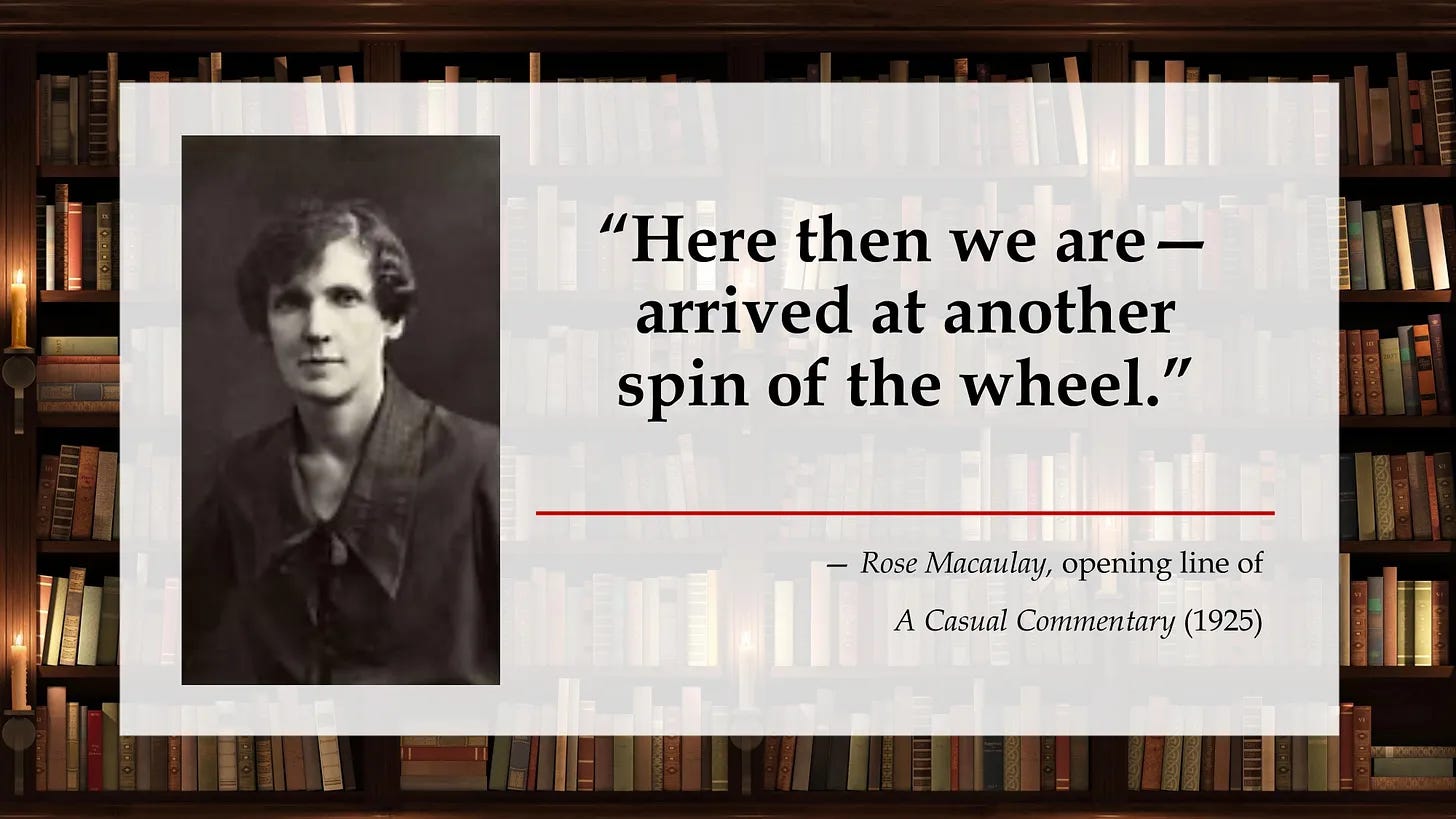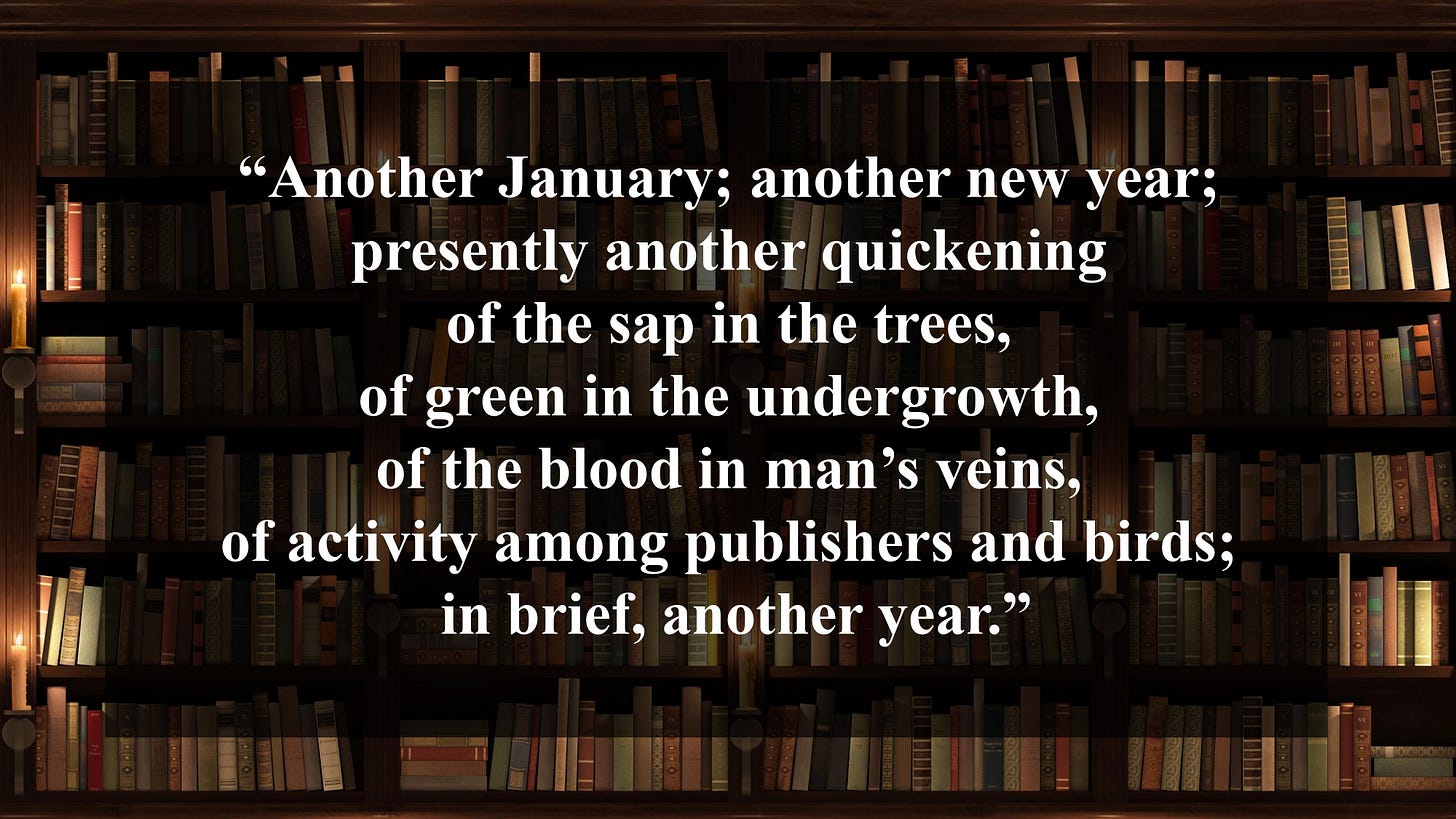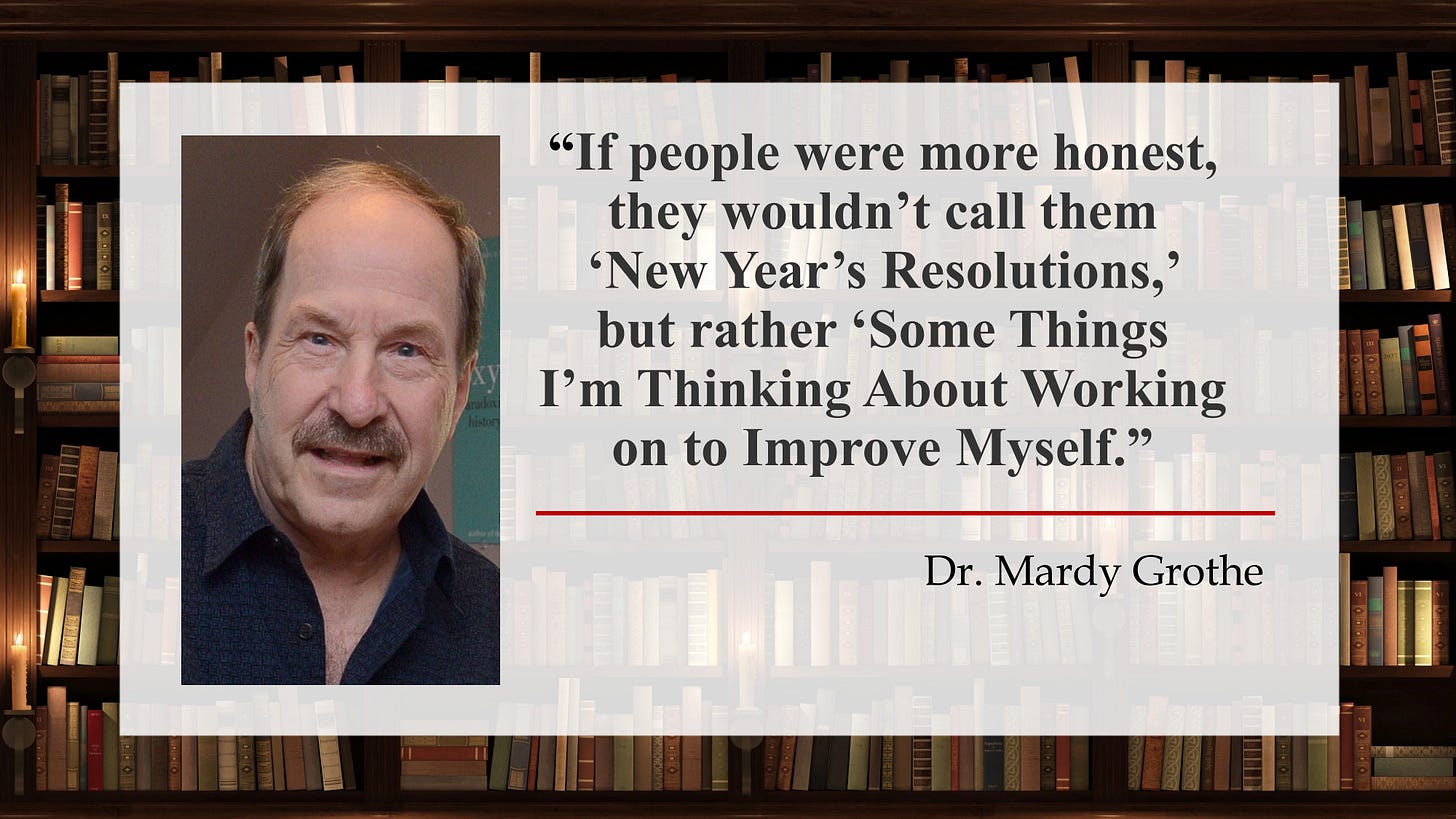Dr. Mardy's Quotes of the Week ("New Year's Resolutions")
Dec. 29, 2024-Jan. 4, 2025 | THIS WEEK'S THEME: “New Year's Resolutions"
From the beginning of civilization, the arrival of a new year has been an event of great personal significance—and in an 1823 essay, English writer Charles Lamb provided one of the best explanations for why this is true.
“Every man hath two birthdays,” he wrote, the date of his actual birth and the first day of each new year. In his essay, he continued:
“No one ever regarded the First of January with indifference. It is that from which all date their time, and count upon what is left.”
When I reflect on my career as a psychotherapist and marriage counselor, I’ve often said that I’ve learned much more from my clients than I’ve been able to teach them—and a perfect example surfaced one day when Lamb’s birthdays observation came up in a counseling session.
In this case, my client was an assistant professor of philosophy at a local university, and a highly intelligent, deeply reflective person. At one point, he got an epiphany-like look on his face and said, “Hmmm, I think I’m seeing something new here.” “How’s that?” I asked. And while it’s impossible to recall his exact words, his reply went something like this:
"Regular birthdays tell us how far we’ve come and January 1st birthdays tell us how much further we need to go. That may be the reason we make resolutions on January 1st rather than our actual birthdays.”
I’ve never forgotten that conversation—and I’ve never looked at New Year’s Resolutions in the same way again,
Opening Line of the Week
I’m not sure if Macaulay was the first person to use the phrase another spin of the wheel to describe the ending of one year and the beginning of another, but it’s now become a common expression. And it’s a lovely metaphor for our planet’s annual revolution around the sun. In her essay, Macaulay continued:
For more than 2,000 memorable literary openers, go to www.GreatOpeningLines.com. And if you’d like to receive a daily dose, follow me on Facebook.
This Week’s Puzzler
On January 4, 1965, this American-born English poet died at age 76 in London. Born in St. Louis in 1888, he graduated from Harvard in 1909 and then studied philosophy at the University of Paris. He won a scholarship to attend Merton College, Oxford University, and became a British citizen in 1927 at age 39.
One of the greatest poets of the 20th century, he was also a playwright, literary critic, essayist, and book editor. His works helped to revitalize English poetry and ultimately resulted in the Nobel Prize for Literature in 1948. In his long career, he penned scores of memorable aphorisms and couplets. One of my personal favorites appeared in Four Quartets (1942), where he wrote:
Who is this person? (Answer below)
What “Voice” Will You Be Using in the New Year?
As we begin a new year, this week’s Puzzler quotation seems particularly relevant—and especially that phrase And next year’s words await another voice. But what does it mean? And how does it relate to New Year’s resolutions?
I’ll get to that in a moment, but first a brief word about the word resolution. There are several definitions, but the one that concerns us here is:
“The state or quality of being resolute; firm determination; a resolving to do something.”
Resolution is a close cousin of two other words: resolve, which means “to make a firm decision about,” and resolute, which means “firm, determined, unwavering.” And, of course, words like firm, determined, and unwavering perfectly capture the motivation behind resolutions that are made at this time of year. This steadfastness of purpose even shows up in the way they are commonly phrased: “In the new year, I resolve to….”
From the earliest days of civilization, resolutions to live a better life have been associated with this time of year. Over 4,000 years ago, at festivals celebrating the new year, it was a common practice for ancient Babylonians to resolve to pay their debts or return items they had borrowed in the previous year. Centuries later, during the Roman Empire, the practice was still going strong. In the case of the Romans, though, resolutions were made in honor of Janus, the god of beginnings and endings (January is named after him).
In medieval Europe, the tradition further evolved when knights took “The Vow of the Peacock” at the last feast of Christmas week. In the symbolism of the era, the peacock represented such ideals as bravery and honor, and its spectacular plumage conveyed the ideas of splendor, majesty, and standing out from the crowd. During the feast—with a roasted peacock as the main course—knights would take turns renewing their vows of chivalry and identifying the specific duties they intended to uphold in the coming year.
The modern focus on personal development in new year pledges began to emerge in various Protestant denominations in the 18th and 19th centuries—and particularly among Methodists, where “covenant renewal services” at the start of the year included a formal goal-setting component.
The term “New Year’s Resolution” first appeared in a Boston newspaper in 1813, and a century later the “self-help” movement fully secularized—and internationalized—the practice of identifying self-improvement goals in New Year’s Resolutions. For an informative and entertaining historical review, check out this CBS Sunday Morning broadcast from a few years ago:
If you’re currently in the process of making New Year’s resolutions, they will very likely have something to do with healthier living, like losing weight, eating better, drinking less alcohol, exercising more, or quitting smoking.
There’s also a very high probability they will fall into the self-improvement arena, such as becoming a better listener, developing more patience, being less judgmental, reading more, controlling your temper, learning a new language, getting more organized, or spending less time on video games or unhealthy web sites. Whatever your resolution, I wish you well, because there’s a very good chance that you will fall short in your efforts. I’m sorry to sound such a sour note, but that is clearly what the research shows. And that brings us back to that intriguing phrase from this week’s Puzzler: next year’s words await another voice.
In his observation, I believe this week’s Mystery Man was saying that, to make the new changes we need to make in life, it is necessary to find a different “voice” than the one we employed in the past. And the voice we need to employ, he was suggesting, is not a weak, namby-pamby one that says, essentially, “I hope I can accomplish this, but I’m not sure I have what it takes.” On the contrary, he was advocating a voice with firm resolve like, “I am a strong and effective person who has the perseverance and determination to accomplish even the most difficult goals.”
This kind of thinking is based on a longstanding intellectual tradition that believes our thoughts and the things we say to ourselves play a pivotal role in our lives. The idea has been around since antiquity and was beautifully expressed by one of history’s greatest thinkers:
In modern times, the old expression “the way we think about things” is now often referred to as “self-talk”—and it is commonly the focus of sports psychologists dedicated to improving the performance of athletes as well as psychologists trying to help clients identify how their own thought processes can sabotage their most fervent efforts to improve. Few have expressed the phenomenon as well as Marvin Marshall, the respected psychologist who wrote in a classic 2001 book:
This week, as you’re finalizing your New Year’s Resolutions, remember that you’re engaging in a practice that goes back over 6,000 years. And when you actually write them down, don’t be wishy-washy. Express your resolutions in a “voice” that is firm, determined, and, most of all, resolute. Before doing anything, though, take a few moments to peruse this week’s compilation of quotations on the theme:
New Year’s Resolution: To tolerate fools more gladly, provided this does not encourage them to take up more of my time. — James Agate
Some people have a regular practice of making New Year resolutions—generally shattering them before January has hidden its cold head out of sight. — Will Carleton
The object of a New Year is not that we should have a new year, it is that we should have a new soul. — G. K. Chesterton
My new year’s resolution: Never be afraid to be kicked in the teeth. Let the blood and the bruises define your legacy. — Lady Gaga, in a 2012 FaceBook post
Always bear in mind that your own resolution to succeed is more important than any other one thing. — Abraham Lincoln
Tomorrow is the first blank page of a 365 page book. Write a good one. Brad Paisley, in a Dec. 31, 2009 Tweet
Perhaps there is no more important component of character than steadfast resolution. — Theodore Roosevelt
New Year’s Day. Now is the accepted time to make your regular annual good resolutions. Next week you can begin paving hell with them as usual. — Mark Twain
There is no chance, no destiny, no fate,/Can circumvent or hinder or control/The firm resolve of a determined soul. — Ella Wheeler Wilcox
Cheers to a new year and another chance for us to get it right. — Oprah Winfrey
For source information on these quotations, and many other quotations on the topic of A NEW YEAR, go here. For quotations on NEW YEAR’S RESOLUTIONS, go here.
Cartoon of the Week
Answer to This Week’s Puzzler:
T. S. Eliot (1888–1965)
Dr. Mardy’s Observation of the Week
Thanks for joining me again this week. See you next Sunday morning, when the theme will be “The Writing Life.”
Mardy













So very much to comment on New Year Resolutions as you presented them! I'll try to keep it pithy.
First thought is that too much of Resolutions are about what we are going to do rather than what we are going to become.
Remember SMART goals: Specific, Measurable, Achievable, Relevant, Time-bound.
Most New Year Resolutions fail, as you said, and I would suggest that the main reason is not that they were about doing, nor that they were not SMART goals, but that they were not part of achieving a defined life vision. It's the vision that gives us the motivation to achieve our goals, whenever we set them.
As you might expect, this has been a very tough year for me. My resolution is to keep living and pushing on.